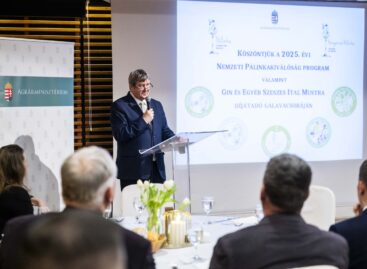A record number of entries were received for the Brillante-2024 International Pálinka and Distilled Competition
A record number of entries were received for the Brillante-2024 International Pálinka and Distilled Competition announced within the Gyula Pálinka Festival. The prizes will be awarded on May 18, the organizers announced.
 Tímea Varga-Bora said that 1,353 samples were received this year, compared to 1,178 last year. A significant part of the entrants have been returning contestants for years, but an outstanding number of them have applied for the first time – he noted.
Tímea Varga-Bora said that 1,353 samples were received this year, compared to 1,178 last year. A significant part of the entrants have been returning contestants for years, but an outstanding number of them have applied for the first time – he noted.
Most of the distillates, 219, came from grapes and grape-derived products this year. 97 samples of the fruit of the year, the quince, were submitted. Distillation has also arrived from Romania, Slovakia, Serbia and Croatia, he said.
The submitted items were evaluated by a 23-member jury of recognized domestic and international judges at the beginning of April. They examined whether the taste and smell of the product is pure, and whether the character of the fruit used as raw material can be felt. In addition, the texture and the overall impression were also scored – he explained.
Related news
Pálinka, my love…
🎧 Hallgasd a cikket: Lejátszás Szünet Folytatás Leállítás Nyelv: Auto…
Read more >The National Pálinka Excellence Program 2025 awards were presented
🎧 Hallgasd a cikket: Lejátszás Szünet Folytatás Leállítás Nyelv: Auto…
Read more >Restaurant representation: tax exemption is coming, pálinka is also included in the circle
🎧 Hallgasd a cikket: Lejátszás Szünet Folytatás Leállítás Nyelv: Auto…
Read more >Related news
II. Green Gastronomy – Marketing Communication Workshop organized by the MMSZ HoReCa and Green Section
🎧 Hallgasd a cikket: Lejátszás Szünet Folytatás Leállítás Nyelv: Auto…
Read more >Retail sales of organic products in Hungary increased by 13.9% – our country is the second fastest growing market in the European Union
🎧 Hallgasd a cikket: Lejátszás Szünet Folytatás Leállítás Nyelv: Auto…
Read more >








